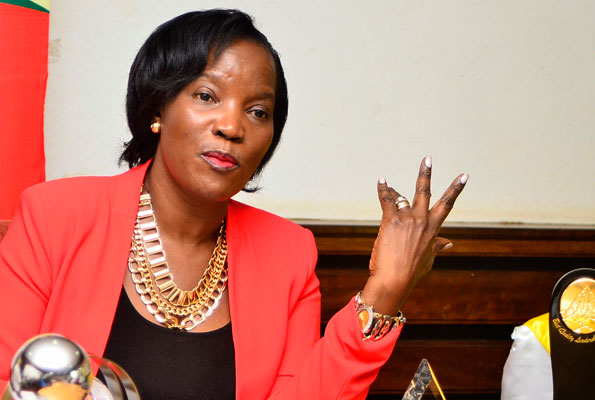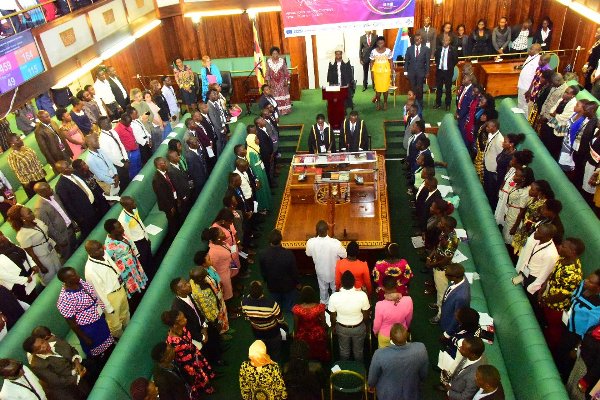Like most city leaders, Jennifer Musisi, the former municipal head of Kampala, Uganda’s capital city, came into office with plans to shake up how local government did business. She wasn’t afraid to ruffle a few feathers in order to improve how Uganda’s largest metro area, long plagued by corruption and poor administration, provided services to its one and a half million residents. What she didn’t expect was that her pursuit of greater government efficiency and transparency would result in threats on her life.
“One time a grenade was found under my car,” said Musisi, speaking to a rapt audience at the Ash Center, where she is the inaugural City Leader in Residence with the Bloomberg Harvard City Leadership Initiative, which is housed at the Center. “It was shocking to see the extent to which the resistance could go—blow me up because I’m trying to organize the management and finances of the city.”
“Why are they trying to kill me? I’m the good guy here”
In December of last year, Musisi stepped down after almost eight years running the Kampala Capital City Authority (KCCA) where she bolstered city services and overhauled the authority’s finances. “She has a global reputation for strong urban governance, integrity, fighting corruption, organizational leadership, and building service delivery systems in institutions that are crippled by resource constraints and corruption,” said Jorrit de Jong, Lecturer in Public Policy and Management at HKS and faculty director of the Bloomberg Harvard program.
A lawyer by training, Musisi was tapped in 1999 to head up the legal department of the Uganda Revenue Authority (URA), the country’s principal tax collection agency, which at the time was rife with corruption and management problems. At the URA, Musisi helped build a team of enthusiastic young civil servants who revamped the agency, ultimately achieving what she termed “an incredible level of tax collection.” She also helped to instill in Ugandans a sense of civic obligation to pay their taxes, which Musisi credited with slashing tax avoidance levels throughout the country.
It’s not surprising that after the task of rebuilding the country’s tax collection systems, Musisi thought perhaps she could look forward to a less stressful private-sector job or even a little extra time off. Half-joking, she said, “I thought it would be time to take early retirement. I’m going to private life, make a little money, and just go to the beach.”
Her long-awaited seaside sojourn, however, was interrupted in 2010, when Uganda’s parliament passed legislation replacing the Kampala City Council with the KCCA. Ugandan President Yoweri Museveni asked Musisi if she would take the reins of the newly constituted KCCA as its first executive director, a position akin to that of city manager in many North American municipalities. Musisi recalls, “The president, in his words, said ‘help me sort out Kampala.’”
“I don’t consider myself a technocrat in the real sense of the word. I just want to get things done”
With her background building revenue collection and human resources systems for the URA, Musisi set about overhauling Kampala’s municipal government. Even the seemingly straightforward task of tallying up the number of active city employees proved to be a challenge. “There were almost no records. No one knew how many staff were in the organization. There were some staff on the payroll. Others were not on the payroll. Others were temporary,” Musisi recalled.
Aside from figuring out how many people actually worked for her, Musisi tried tallying up Kampala’s municipal assets—from real estate to bank accounts. “No one knew how many assets the city had, so every other month we would discover another asset. I would write and say, ‘Hey, this belongs to the city, not you. Can we have it back?’” Musisi chuckled, recalling the delicate and sometimes dangerous conversations to reclaim city property. After pressing Uganda’s central bank to conduct an audit of the city’s various bank accounts, bankers found 151 previously unknown accounts belonging to the KCCA, holding over $13 million—a staggering sum for a city that was at the time collecting only $11 million in annual tax revenues. In contrast, Philadelphia, with a roughly equivalent population, collected $4.6 billion in revenues in its most recent fiscal year.
To tackle the city’s financial shortfalls, Musisi terminated contracts with revenue agents who were inefficient but, nonetheless, were given, or took, a cut of the tax proceeds they collected on behalf of the city. Needless to say, the old system bred inefficiency and corruption. In the new system, the KCCA made it easier for residents to pay their tax bills directly through the banks and built a modern revenue management system to help with billing, assessing, and payment.
Musisi also worked to gain the trust of taxpayers, who, after years of mismanagement and corruption, were at first skeptical that her changes would lead to real and meaningful reforms. “We needed to first of all assure the public that we were there to change things for the better, to serve, and that we’re going to be accountable,” said Musisi. Her plan for building public support was simple: “We worked to make everybody pay and show how those taxes were being used to improve city services.” Five years after Musisi shook up the city’s tax collection system, revenue growth was up over 190 percent. “Because this revenue was coming in, we were able to do more for the public.”
While Musisi’s reforms resulted in a growing municipal budget and improved services for everyday Kampala residents, those who previously benefited from the city’s archaic and corrupt tax collection system did not relinquish the status quo easily. “The agents that were collecting taxes for the city were very powerful… and had been collecting the taxes for decades. They felt an entitlement,” said Musisi, looking back at the fight she knew was brewing with beneficiaries of Kampala’s history of corruption and patronage. “They thought I was joking.”
It quickly became clear, however, that Musisi was not joking. The revenue agents responded by threatening to take her to court. “Go ahead. I think the law is on my side,” she said. It was, and Musisi and her team soldiered on. When legal challenges failed, “then they started mobilizing the public not to pay because they said we are going to steal the money anyway because it’s always been stolen,” Musisi recalled. “We kept telling the public, “This is what we collected. This is what we used it for.” It worked, and revenue collection numbers increased as Kampala taxpayers were swayed by the KCCA’s transparency and competence in administering city services.
The revenue agents, loath to lose their cut of the city’s taxes, next turned to graft, assuming that Musisi and her colleagues would rather line their own pockets and backtrack on their reforms. “They offered me huge bribes, really huge bribes. I said, ‘I always said I don’t do bribes.’”
“Then they started threatening our lives,” she said. “Why are they trying to kill me? I’m the good guy here. It was shocking to see the extent to which it could go, with violent attacks targeting my staff because we’re trying to organize the finances of the city.” Her colleagues had guns pulled on them, their homes invaded. Security for Musisi and her team was increased. She told a shaken staff that this was their opportunity to transform Kampala for the better. “The bad guys can’t win. That was what kept us going.”
“She went straight for the most critical function of government,” remarked de Jong, referring to Musisi’s decision, after taking the reins of the KCCA, to forgo scoring easy political wins and instead tackle a complex structural issue such as revenue reform. “Without revenues, you can’t do anything, and without addressing the corruption you can never build trust,” he added. Without an increase in revenue, Musisi would never have the funding necessary to address the city’s infrastructure problems, build and renovate schools, improve the quality of public health care, or fix the litany of other urban ails that plagued Kampala. “We knew that without funding we could not do much, and with that funding we could really get the low hanging fruit, begin fixing the city.”
Musisi has been hailed as an “incorruptible technocrat” by Uganda’s press for reforming Kampala’s municipal tax collection and procurement policies, but she bristles at the characterization. “I don’t consider myself a technocrat in the real sense of the word. I just want to get things done.” De Jong agrees, “I don’t think the technocrat term really applies because she knew what the tools of government were, how they worked… but a large part of this work of innovation is building trust with the community. It’s that trust that Musisi instilled by standing up to threats and bribes, and by showing residents of Kampala how their hard-earned tax dollars were being used to help improve the city.” Musisi added, “When you have a desire to get things done, you just begin to innovate because you’re looking at the end and then working through whatever you need to work through to reach that end.”





